
On behalf of the Board of Directors of FrieslandCampina Engro Pakistan Limited (a majority owned subsidiary of FrieslandCampina Pakistan Holdings B.V. which is a subsidiary of Zuivelcoöperatie FrieslandCampina UA (the Ultimate Parent Company) and based in Netherlands), we are pleased to present the annual report and the audited financial information of the Company for the year ended December 31, 2019.
In 2019, the Company continued its strong growth momentum and delivered a robust topline growth in each of the four quarters. The Company has reported a revenue of Rs. 38.9 bn in 2019, recording a 20% increase vs last year. This growth came primarily on the back of strong volumetric gains in both Dairy and Ice Cream business segments.
Sharp economic headwinds, particularly steep increases in commodity costs due to devaluation of Rupee and rising interest rates, have put pressure on overall company profitability. As a result, gross margin reduced from 16% to 13%. The Company has taken price increases across its portfolio in the last 6 months to offset these inflationary pressures. The interest cost for the Company has almost doubled primarily on account of higher interest rates. A once-off tax adjustment of Rs 153 million was also recorded due to revision in the Finance Act 2019. As a result, the Company registered a loss after tax of Rs 955 million vs a profit of Rs 64 million (loss per share of Rs 1.25 vs a profit per share of Rs 0.08) in the same period last year.

The Dairy and Beverages segment reported a revenue of Rs. 34.9 billion vs a revenue of Rs. 29.0 billion in 2018, registering a growth of 20% vs last year.
The segment has maintained the strong growth momentum in both its core brands, i.e. Olpers and Tarang, which continue to win in the market on the back of significant brand investments since their relaunch last year. The segment has grown volumes by 17% whilst the consumer goods sector has been relatively stagnant. The growth was aided by an effective communication spend and expansion in retail coverage by more than 12,000 outlets. As a result, both Olpers and Tarang have gained market share leadership in their respective categories.
The Company’s new launches in 2019, i.e. Olpers full cream milk powder (FCMP), Olpers Creams, Olpers Pro-Cal and Tarang Elaichi, have received a positive response from both consumers and trade and have gained a healthy market share in a short span of time 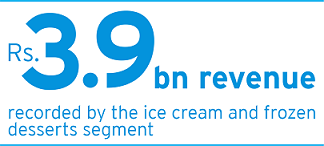 despite strong competition from established players. The Company will continue to leverage FrieslandCampina’s global expertise to introduce new products and innovations as a key driver of future business growth.
despite strong competition from established players. The Company will continue to leverage FrieslandCampina’s global expertise to introduce new products and innovations as a key driver of future business growth.
The Ice cream and Frozen Dessert segment reported a revenue of Rs. 3.9 billion in 2019 vs a revenue of Rs. 3.4 billion last year. The business has focused on creating excitement for consumers by introducing 9 new products and communicating the novelty of Omoré through “summer blockbuster” campaign. The category has also successfully inducted various new freezers and trikes in the market, further strengthening its trade footprint across 240 towns.

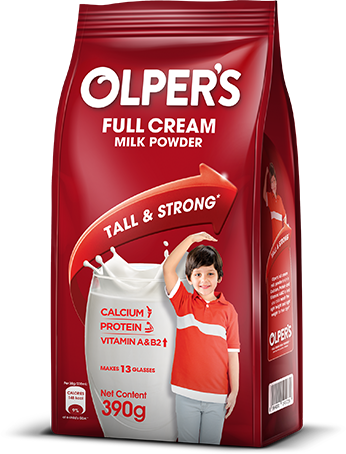
The Company’s Dairy Farm continued to be a rich and nutritious source of raw material for our dairy segment. However, rising interest costs and feed prices, along with valuation losses due to lower market prices of animals resulted in a loss of Rs. 322 million for the segment during the period.
Providing the growing population of Pakistan with the right nutrients in a sustainable way is one of the challenges for the coming decades. By offering trustworthy, relevant and nourishing dairy products, the Company contributes to food and nutrient security of millions of Pakistanis. The Company’s purpose resonates with – ‘Nourishing Pakistan’ – which stands for its promise to provide better and safe nutrition for its consumers, realise a good living for our farmers, for now and generations to come.
Preventing and combating non-communicable diseases (obesity, undernutrition and food-related diseases) is a shared responsibility of consumers, governments, and NGOs, as well as food producers and food suppliers. The Company sees it as part of its responsibility to constantly contribute to addressing this challenge and to work together with these stakeholders worldwide.
The Company understands the changing needs of its consumers and in order keep up its commitment to its stakeholders and empower its dairy farmers. In 2019, the Company contributed PKR 30 million (including 10 million in Fixed Cost support) under its social investments commitments for its farmer and surrounding communities.
The Company’s social investments programs have been managed by Engro Foundation – together with partners who work in the areas of education, health, infrastructure, livelihoods and disaster management to provide socio-economic opportunities to a multitude of individuals in the communities it operates in. Moreover, the Company continued its strategy to work towards generating greater sustainable impact by focusing on business inclusiveness.
The Company started a school adoption program in 2011 near its production facilities to provide the opportunity of education to the children from surrounding communities. This was an initiative to create better opportunities for the underprivileged and help build the community. The Company has been supporting six schools near its plants. In 2019, the Company invested PKR 4.5 million in two adopted schools near its dairy farm in Nara Sindh and PKR 7.0 million in the 4 schools near Sahiwal plant. Its employees conduct periodic community engagement sessions at these schools on the importance of environment, safe nutrition, cleanliness, health and safety.
Basic healthcare problem is one of the major dilemmas in under privileged communities across Pakistan. The mainstay of a healthy community is its mental and physical well-being. The Company’s efforts are directed towards empowering and developing its farmers and surrounding communities, which is in line with two of the United Nation Sustainable Development Goals. The Company invested a total of PKR 8.5 million in its Health Center near its Sukkur plant. To date 13,000+ patients from underprivileged sector have been treated at the Company’s Health Centre.
The Company has a network of more than 1,300+ milk collection centers which collects milk and provides livelihood to 250,000+ farmers and milk suppliers across Pakistan. Through its numerous dairy development initiatives, the Company directly contributes to the growth in dairy and livestock sector in Pakistan, which is around 11% of AGDP (Aggregate Gross Dometic Product) and accounts for 60% share in the agriculture sector.
As part of its regular dairy development programs, the Company has trained 53,000+ farmers in 2019 on animal health, nutrition & farm management. To overcome the scarcity of fodder at farms affiliated with the Company, its teams have assisted farmers in silage making and bales of 150 K tons worth Rs. 880 million. In addition to this, as part of its financial inclusion program, the Company has paid short term advances worth PKR 200+ mln to its farmers for working capital management.
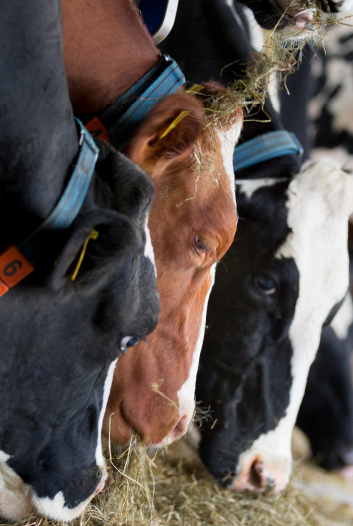
The Company is committed to create social progress through programs devoted to improving livelihood and capacity building of small farmers with a special focus on women. The Company feels that there is a dire need for transfer of knowledge to these farmers in order to improve the productivity of the local Pakistani cattle breeds.
To address this concern, the Company initiated number of projects in past, EWID is one of the initiatives started in 2019, this project is co-funded by Department of Foreign Affair & Trade - Government of Australia, whereby the Company will transfer knowledge and train 4,100 farmers mostly women & 100 female livestock extension workers. Female extension workers will go through extensive training program & internship at farms to work as self-sustainable entrepreneurs.
WTLM is another project in collaboration with Punjab Skills Development Fund, for training and capacity building of 1,500 female farmers on basic livestock farming for optimum milk production. Selected female farmers went through a 45-day class room & demonstrative training course designed by the Company on disease control, fodder preservation and breed improvement.
At FrieslandCampina Engro Pakistan, the employees are the backbone of the organisation. Over the course of the year, the Company took several steps to fortify each phase of its talent recruitment and engagement funnel resulting in optimally-placed, culturally- compatible and motivated new recruits and employees.
While the overarching theme of 2019 was adjustment and consolidation, the Company navigated the shifting landscape by delving a little deeper and mapping its human resource investments and initiatives to changes in strategy.
In 2019, the Company focused on training new, and retraining existing resources in emergent technologies, methodologies and skills by introducing several globally driven initiatives. The Company reinvented its productivity workflows with more emphasis on collaboration, and measurement via project tracking processes and management.
There was a lot of focus on making the Company’s values livable by incorporating the win-win behaviours into actionable plans. In 2019, the Company introduced a Win-Win Week, where all employees participated in activities that helped them understand these behaviors and how to incorporate them into their daily routine.
The Company worked on expanding its lateral-thinking capabilities with a renewed focus on sustainability and inclusivity while developing personalised-capability plans for each division to build a strong talent pipeline which can sustainably create seasoned leaders.
A behavioural change workshop was conducted - with live simulations - for senior leaders & team leaders, to enable them able to recognize, understand and adapt to change in real-time.
These efforts yielded an employee engagement score of 80% (+3 > 2018), which placed the Company amongst the highest ranked OPCOs within the FrieslandCampina universe.
In 2019, the Company introduced its first ever internship program for the differently-abled. The Company also conducted sensitization sessions for various teams and to encourage open dialogues between employees. The Company is rethinking its office environment and physical infrastructure from an Accessibility perspective.
The Company launched a future leaders program which has diversity as a core tenet. Within the current employee structure, the Company has conducted gender audits and there is a pledge to continually reduce the disparity across every strata of the organization. Currently, the Company has a 6.5% diversity ratio
The goal is to create a vibrant culture which is more inclusive, promotes gender equality and recognises diversity as a pillar of strength, and a strategic advantage.
The Company strongly believes in maintaining the highest standards in Health, Safety and Environment (HSE) to ensure the well-being of the people who work with it as well as the surrounding communities, where it operates.
for its plants in Sukkur and Sahiwal and Dairy Farm in Nara
The Company’s employees and contractors are expected to conform to its HSE management systems and processes which have been designed keeping in view international standards and best practices. Over the years, the Company has embarked on ambitious plans to achieve Occupational Safety and Health Administration (OSHA - USA) compliance through DuPont Alignment and has been successful in its endeavors.
A work-place safety program has been implemented, that actively seeks to reduce the potential risk of injuries within the work-place by conducting safety gap analysis. Since DuPont Safety Management is essentially a people-focused tool, the Company has also invested heavily in employee engagement by conducting trainings that spanned over the year, with a cumulative total of 13,000+ training hours. To reaffirm its commitment to safety of its employees and draw maximum buy-in, the Company hosted a series of engagement events including Safety Weeks & Safety Champions of the Month.
Alignment with FrieslandCampina Global HSE Management System ‘FOQUS SHE’ was carried out and the Company became the first Operational Company in FrieslandCampina world that achieved “Satisfactory” result in its first assessment. To further increase awareness of employees on serious injuries & threatening risks at work places, introduction of Seven ‘Life Saving Rules’ was one of the major value additions in 2019. To make its factories compliant with ATEX (EU Directives for controlling explosive atmospheres), assessment of ‘Powder Dust Explosion Hazard’ was carried out along with action plan. Moving forward in 2020, Machine Safety Assessment is one of the key areas where the Company is committed to add value.
As a result of its efforts and focus on stringent and best in class HSE guidelines, the Total Recordable Injury Rate (TRIR) has declined significantly over the last six years. During the year, the TRIR of the Company’s employees and contractors was recorded at 0.07 with over 14.8 million man-hours clocked in by employees and visitors.
The Company recognizes the need to protect and preserve the planet by going the extra mile to minimize the environmental impact of its business operations and prevent unnecessary wastage of natural resources. The Company’s business strategies are also fully aligned with this vision. In an on-going effort to preserve the natural habitat, the Company has invested in installation of solar geysers at its Area Offices as well as encouraged its supply chain partners working as Milk Collection Centers (MCCs) to shift to solar powered energy, thereby minimizing the carbon footprint of the MCCs.
As part of its ongoing efforts to reduce greenhouse gas (GHG) emissions, the Company is actively promoting the use of Non-CFC products at all its manufacturing units. The Company is procuring eco-friendly air conditioners with refrigerant gases that are not harmful for the ozone layer. The Company is committed to making concerted efforts to protect and preserve the planet for future generations, whilst exercising effective controls to minimize potential environmental hazards. This is reflected in its endeavors to achieve ISO 14001 certifications for its plants in Sukkur and Sahiwal, and Dairy Farm in Nara. Furthermore, 20 area offices of Milk Procurement & Agri Services are ISO 14001 certified. There is also a structured program in place to reduce water consumption on a year on year basis.
The Company’s Head Office, along with the Administration Offices of its Sahiwal Plant, Sukkur Plant and Nara Dairy Farm are certified as ‘Green Offices’ under the Green Office Project by WWF-Pakistan. The pilot project for paper reduction taken up by the Head Office in Karachi resulted in paper reduction of 40%. Throughout the year, various sessions were carried out, including Earth Day and Earth Hour celebration, in order to promote awareness of environmental issues amongst the employees.
The Company has made significant investments at its production facilities to reduce the water consumption. In the last couple of years, the Company has invested to the tune of Rs. 115 million in Water Conservation projects. Water consumption reduced by 19% in year 2019. This was driven by 9% volume growth and projects centered around conservation activities.
The accounting policies of the Company reflect the requirements of the Companies Act 2017 and such approved International Financial Reporting Standards as have been notified under this Act as well as through the directives issued by the Securities and Exchange Commission of Pakistan.
The Company operates a Share Option Scheme. The detail of such scheme is explained in note 10 of the accounts.
The employees of the Company participate in Retirement Funds maintained by Engro Corporation Limited. The Company contributes to plans that provide post-employment and retirement benefits for its employees. These include Defined Contribution Provident plan, Defined Contribution Gratuity plan and Defined Benefit Gratuity plan. The value of investments of the Defined Benefit Gratuity scheme as at latest audited financial statement date is as follows:
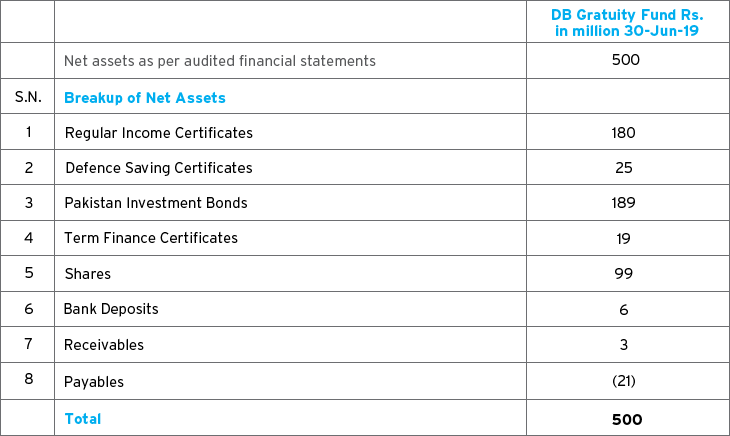
The above mentioned plan is a funded scheme recognized by the tax authorities. The latest actuarial valuation of gratuity scheme was carried out at December 31, 2019 and the financial statements of these have been audited up to June 30, 2019.
The present auditors, M/s A.F. Ferguson & Co. retired and offered themselves for re-appointment as the statutory auditors of the Company. The Board of Directors of the Company have endorsed the recommendation of the Board Audit Committee for the reappointment of M/s A.F. Ferguson & Co.
Major shareholders of the Company are FrieslandCampina Pakistan Holdings B.V. (51%) and Engro Corporation Limited (40%). Other Shareholders are local institutions and the general public.
A statement of the general pattern of shareholding along with pattern of shareholding of certain classes of shareholders whose disclosure is required under the reporting framework and the statement of purchase and sale of shares by Directors, Executives and their spouses including minor children during 2019, is shown later.
The Board is ultimately responsible for the Company’s system of internal control and for reviewing its effectiveness. However, such a system is designed to manage, rather than eliminate the risk of failure to achieve business objectives, and can only provide reasonable but not absolute assurance against material misstatement or loss. The Board, whilst maintaining its overall responsibility for managing risk within the Company, has delegated the detailed design and operation of the system of internal controls to the Chief Executive.
The Company maintains an established control framework comprising clear structures, authority limits and accountabilities, well understood policies and procedures for review processes. The Board establishes corporate strategy and the Company's business objectives. Divisional management integrates these objectives into divisional business strategies with supporting financial objectives.
The Board meets quarterly to consider the Company’s financial performance, financial and operating budgets and forecasts, business growth and development plans, capital expenditure proposals and other key performance indicators. The Board Audit Committee receives reports on the system of internal controls from the external and internal auditors and reviews the process for monitoring the effectiveness of internal controls.
The Company has an independent Internal Audit function. The Board Audit Committee annually reviews the appropriateness of resources and authority of this function. The Head of Internal Audit functionally reports to the Audit Committee. The Board Audit Committee approves the audit plan, based on an annual risk assessment of the operating areas. The Internal Audit function carries out reviews on the financial, operational and compliance controls, and reports on findings to the Board Audit Committee, Chief Executive and the divisional management.
The Company has a formal Risk Management framework to assess the risks faced in the context of the broader political and macroeconomic environment. The Risk Management system identifies strategic, regulatory, financial, operational, reputational, and sustainability risks related to Company’s business activities. The risks are reviewed by the Pakistan Leadership Team along with departmental objectives, targets and performance. Appropriate strategies are developed and implemented to minimize the impact of the identified risks. The Company has formulated its Risk Management structure based on the global practice followed by FrieslandCampina, with the aim of driving the Company growth with managing risk associated with business adequately.
The Directors confirm compliance with the Corporate and Financial Reporting Framework of the SECP Code of Governance for the following:
In 2019, the Board of Directors held 4 meetings to cover its complete cycle of activities. All Board members are given appropriate documentation in advance of each Board meeting. This normally includes a detailed analysis on business and full papers on matters where the Board is required to make a decision or give its approval. The Board deliberates and fixes remuneration for the independent non-executive Directors. The attendance record of the Directors is as follows:

As at December 31, 2019, the Board comprises of seven Directors (6 males, 1 female) including one Executive Director, two Independent Directors and four Non-Executive Directors. The Board has the collective responsibility for ensuring that the affairs of FCEPL are managed competently and with integrity. Mr. Abdul Samad Dawood, a non-executive Director, is the Chairman of the Board, and Mr. Ali Ahmed Khan is the Chief Executive Officer. Biographical details of the Directors are included in this report. A Board of Directors’ meeting calendar is issued annually that schedules the matters reserved for discussion and approval.
The Committee meets to review and recommend all elements of the compensation, organization and employee development policies relating to the senior executives’ remuneration and to approve all matters relating to the remunerations of the Executive Director and members of the management committee. The Head of HR of the Company is the secretary of the Board Compensation Committee Meeting. The committee comprises the following members:
Zouhair Abdul Khaliq Chairman
Petra Attje Zinkweg Member
Ali Ahmed Khan Member
The Board Audit Committee assists the Board in fulfilling its oversight responsibilities, primarily in reviewing and reporting financial and non-financial information to share-holders, systems of internal control and Risk Management and the audit process. It has the autonomy to call for information from management and to consult directly with the external auditors or advisors as considered approtpriate. The Chief Financial Officer regularly attends the Board Audit Committee meetings by invitation to present the accounts. After each meeting, the Chairman of the Committee reports to the Board. The committee met 4 times during 2019. The committee comprises the following members:
Abrar Hasan Chairman
Eduardus Lambertus Holtzer Member
Zouhair Abdul Khaliq Member
The secretary of the committee is Saleem Lallany, GM Internal Audit.
The Directors confirm compliance with the Corporate and Financial Reporting Framework of the SECP Code of Governance for the following:
The business continues to be impacted by an extremely challenging macroeconomic environment with rising inflation and eroding consumer purchasing power. All these factors pose significant challenges to the business profitability in the short term.
The Company’s purpose is to provide a nutritious and safe offering to our consumers. The main source of growth for the Company is conversion from loose milk, which still represents ~90% (20+ billion litres) of untapped opportunity. Loose milk has been scientifically proven to be unsafe for human consumption as a sizeable portion of this segment operates with unacceptable business practices including adulteration, unhygienic conditions and conveyance methods, whilst also contributing negligibly to the government exchequer.
The Company will continue to:
The growth of dairy industry is an extension of the Government’s agenda of improving health and nutrition of masses, hence the Company will encourage the Government to support in creating mass awareness around safe milk consumption and financially incentivize the growth of formal dairy sector through favourable fiscal policies.
Every day, millions of consumers enjoy our products throughout Pakistan, hence the Company remains committed to highest standards in the field of food safety, sustainability and transparency throughout the entire production chain, i.e. “from grass to glass”. The Company will leverage FrieslandCampina’s expertise and heritage of 145+ years to continue to provide affordable, high quality, healthy and safe dairy products.
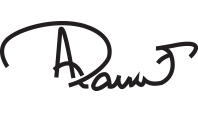
Abdul Samad Dawood
Chairman

Ali Ahmed Khan
Chief Operating Officer
Find out how we performed in previous years. Have a look at our financial highlights or download whole annual reports in PDF.